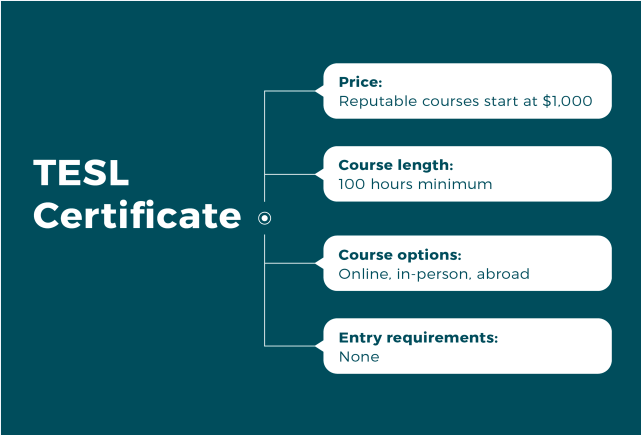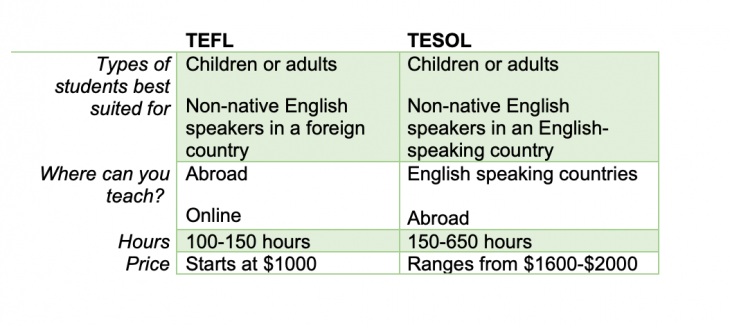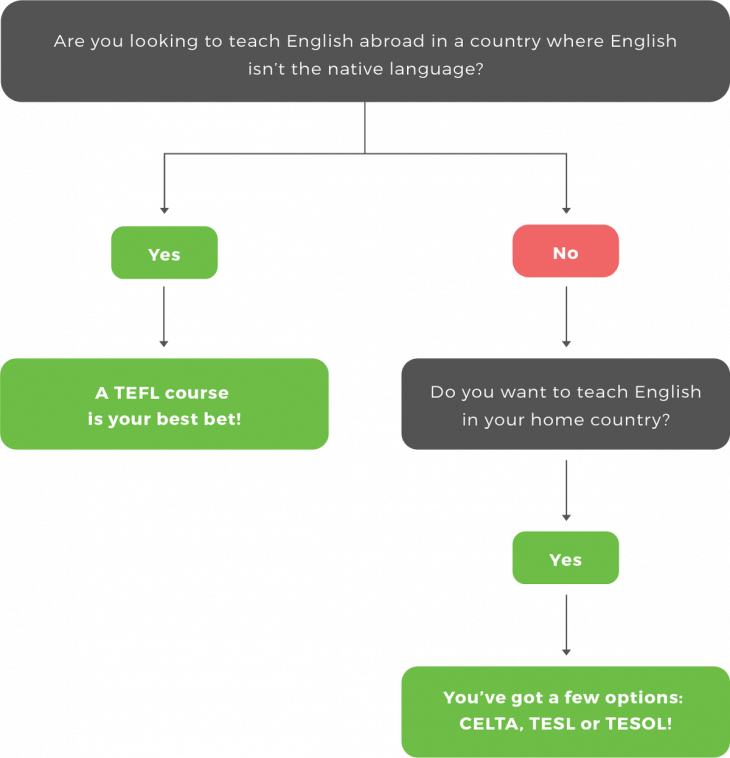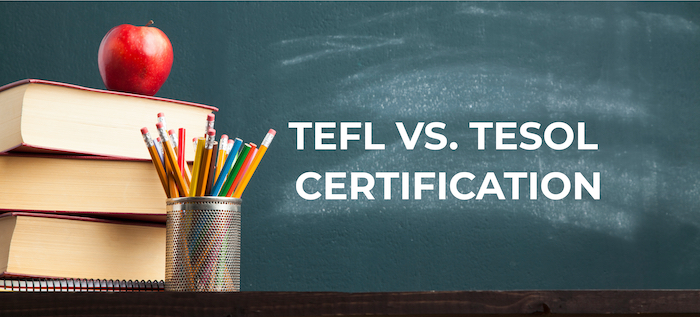If you’re looking to teach abroad, chances are you’ve already stumbled upon these two terms on your job hunt.
They may sound similar at first glance, but they offer different possibilities for teachers.
Feeling lost over which certification path to take? Or, are you wondering what these acronyms even mean?
That brings us to the most important question of all: do you need a TEFL or a TESOL certification!??
Don’t worry, we’ll get you up to speed in this short guide.
We’ll unpack essential information about each of these certifications, starting from the basics to the key differences between TEFL vs. TESOL and which option is best for you based on your goals as a teacher.
Let’s dive in!
What is TEFL?
Alright, first things first. What does TEFL mean?
TEFL stands for “Teaching English as a Foreign Language”. It’s the globally accepted qualification for teaching English abroad (or online) English, as second language English-speaking students (both children and adults).
Most hiring schools look for candidates with a TEFL certification on their resumes. So it’s likely you’ve seen this pop up a few times.
The bottom line is, that some schools require it, while others prefer it. Either way, it’s known as a desirable certification that can help you land teaching jobs abroad quicker.
You’ll likely see this term crop up time and time again during your hunt for a teaching job overseas.
Once you’re TEFL certified, you’ll be eligible to apply for teaching jobs in any non-English speaking country.

What is TESOL?
Now let’s take a closer look into the meaning of TESOL.
TESOL means “Teachers of English to Speakers of Other Languages”.
This is the certification you need if you want to teach English to non-native speakers in your home country, as well as abroad.
This option is great for teachers who are absolutely sure that they want to teach English at home where their students will be fully immersed in the language inside and outside of class.
On the flip side, if you want to teach abroad, the only caveat is that it’s a newer qualification, so it isn’t as well known by overseas employers in comparison to TEFL.
If you want to teach in the US or Canada, it’s important to note that only a 250-hour certification course can qualify you to teach in North America. Anything less than 250 hours will only qualify you to teach overseas.

TEFL vs. TESOL certification comparison
Now that you know the basics, it’s time to see how these two certifications stack up against each other.

As you see here, there are some key differences between these certifications.
The main difference is that TEFL is for teaching English abroad and TESOL is designed specifically for teaching English at home.
Also, the amount of time and work needed to get certified is also different.
TEFL is a lot lighter in terms of coursework and can be completed in around 100-150 hours in comparison to TESOL, which is far more intensive and requires around 150-650 hours of coursework.
Cost-wise, prices for TEFL vary, but a university-backed program will typically start at $1000.
As for TESOL, prices get a little steeper with an average price range from $1600-$2000. So be prepared to spend a bit more if you’re after a TESOL certification!
Which is better, TESOL or TEFL certification?
It depends on whether you want to teach in an English-speaking country or abroad. And the quality of instruction varies by the course provider.
We will say that TEFL is more internationally recognized than TESOL since it’s been in the global education game for a while now. So it’s the better option if you’re planning on teaching abroad.
In any case, the important thing to remember is to do your research on the course you’re considering to ensure it’s worth the time and investment and that it qualifies you for the jobs you want.

Remember that reputation matters.
Since there is no global governing institution providing accreditation for courses, creating standard curriculums, or ensuring quality, many new certification courses surface without being vetted.
Documents issued by unrecognized educational institutions can’t be authenticated for use overseas. That’s why we always recommend choosing a course from a reputable university or institution.
If you’re taking the TESOL training route, Woodsworth College offers accredited TESOL courses.
Which certification is right for me?
As promised, we’ll help you get on the right track for certification with the help of a visual diagram. Use our nifty chart below to find out which program is right for you!

Hooray! ? You found the one!
Now that you know which option is right for you, you’re ready to take the first steps towards certification by enrolling in a program.
But don’t exit the page just yet because below we have a few quick tips to help make your journey to certification as smooth as possible.
Pro-tips for choosing a certification path
Before you enroll in a certification program, make sure that the program is:
- Recognized globally or domestically by schools
- Meets the minimum hours/requirements for certification
- Is offered by a recognized educational institution like a university or college
With a never-ending supply of TEFL or TESOL courses cropping up across the internet, it could be tempting to go with the cheapest option, but be wary if something seems too good to be true or too easy.
Sometimes teachers will enroll in questionable programs that may not be accepted by employers or offer a low-quality curriculum.
The quality can be so poor that they don’t learn the right tools or strategies needed to teach non-native language learners and may feel lost in front of the classroom.
We’re gonna sound like a broken record here, but try to only consider programs from recognized educational institutions. It’s better to be safe than sorry.

Register for a course that makes sense for you!
In short, if you’re looking to get overseas, a TEFL is your best bet.
Find a course that’s reputable with a curriculum you’re excited about and get yourself ready to teach abroad!



